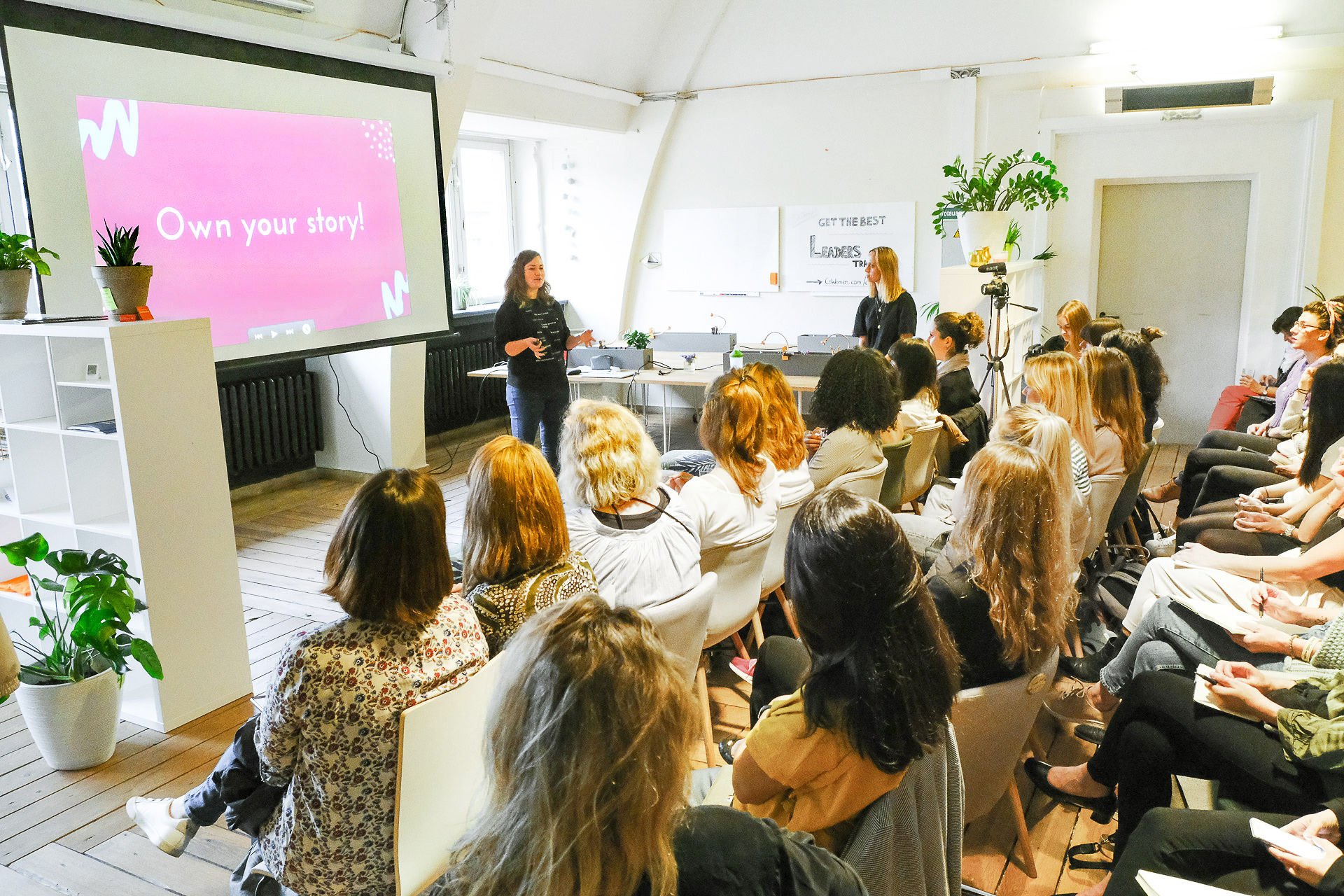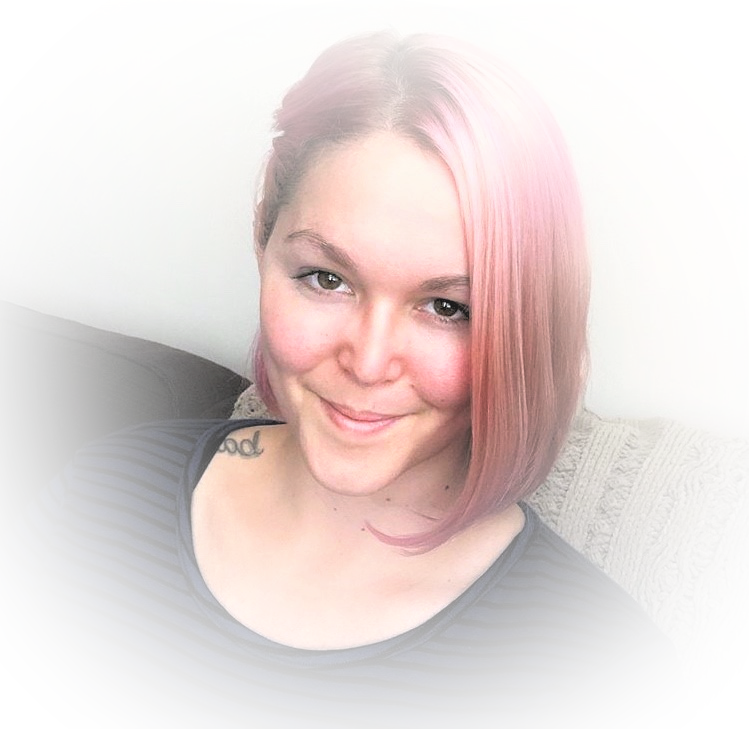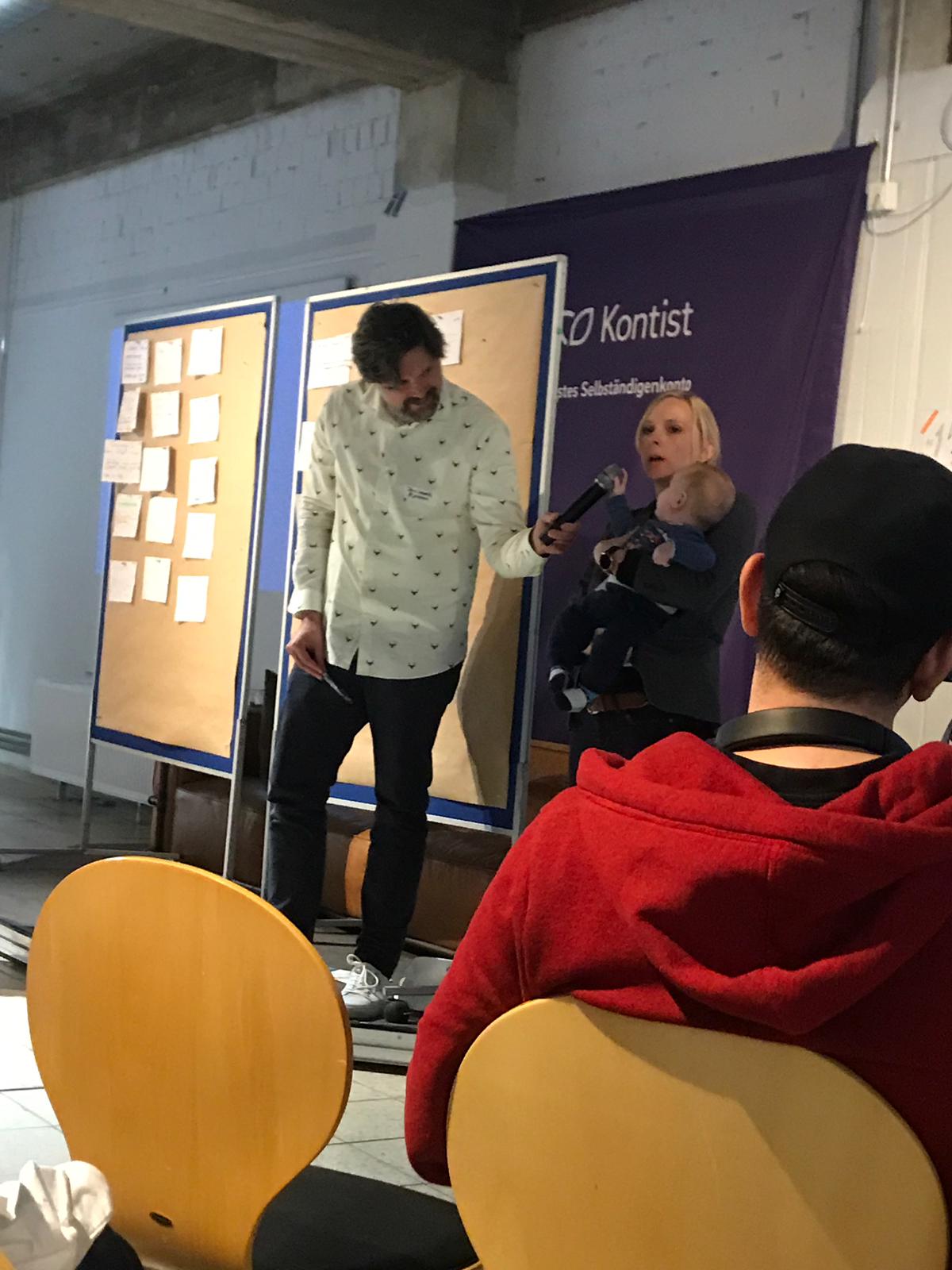Finding my value as a female freelancer

A question that comes up at the end of any successful first meeting with a new client. And it’s a question that I’ve cringed at and felt uncomfortable with for a long time. It’s a loaded question, which asks, "how much are your services worth?" And subtly insinuates, "how much are you worth?" No wonder it makes many of us feel uncomfortable. In many a situation, I’ve undersold myself, in terms of both my skill base and my hourly rate. So, I’ve decided, using my platform on CoWomen, that I’d like to open a discussion of finding personal value in the world of entrepreneurship.
This discussion has many different components. But, at least in my case, can be split down the middle into two rough categories. These are; knowing myself and my value, and secondly, showcasing and communicating my value outwardly to clients, coworkers, and others. We’ll tackle them one at a time…
Starting with ourselves:
The former category is the more challenging of the two for me. It’s something that I’ve really had to work on and still remind myself of often. Doubting ourselves is something that we’ve all done -or do- to some extent. And when starting out on your own, that can be even more prominent. Especially as a young female, often in environments dominated by people older than me. Fighting back against self-doubt has been one of my single biggest challenges, and most real key successes to date.
One way I challenged myself to think differently was by creating two lists on a piece of paper. One list contained my ‘drawbacks’ and the other side listed things I had achieved, my values, things I was proud of, and short term goals. For example, in the back of my mind has always been the murmur, "but you’re only in your early 20’s, you don’t have the skills or experience that ‘x’ requires." I scribbled this down on my paper, and linked this to statements on the other side, such as, "I have done x internship at x company." "I have demonstrated willingness to learn and adapt by x, y and z." "I have learnt a wide range of transferable skills by…" You get the idea.
This piece of paper with all of the intertwining links became my ‘bullshit-buster.’ Whenever doubts flew into my brain at the speed of light, I’d have instant ‘put-downs’ to my own negative, thoughts. Writing down the things I was worried people in my professional life were thinking about me, but then linking them up with honest examples of why they weren’t true, or at least why they shouldn’t be reasons to collaborate with me, I learned that my value was much greater than I’d previously thought. "I do have the skills, my potential is great and I’m excited to continue on my journey as a young female freelancer." My mantra.
Crunch time:
Before many a meeting, I’ve sat in front of a mirror, wondering if I’m dressed too smart, too casual, how I should introduce myself. How I can add value to this company, and ultimately how I can get the people on the other side of the table to want me on their team? Having your bullshit-buster in hand -or at least memorised in your head- is a great aid to have at this moment.
If I’m having a meeting with a new potential client, it’s because I can see myself as a part of their team. I’ve certainly already done my research, had a chat with someone on the team via email or phone, and I’m excited by the prospect of working together. From their side, they know I’m very interested and they must think (or even just have a hunch) that I’m somewhat capable or passionate.
Bearing in mind that the people opposite of you aren’t doubting your every word. Rather, hopefully, they’re interested in how you are interacting and presenting yourself; listening to your ideas and also giving you information on the role and their wants and expectations. At some point, however, the question we started this whole article with will come up. ‘
"So, what’s your rate?"
You’ve probably practiced answering this answer many times. Breathe you’ve got this. Now, you know your worth in terms of what you can bring to the table, what’s required of you in this potential new role, and what you believe you should be paid… Now add tax. Money isn’t the be-all end-all, but this ‘business’ you’ve got going on…it should be benefiting you financially. So, up that hourly rate a little, add tax or a little something to cover potential overheads, and be confident with the number you serve back over to the other side of the table. What’s the worst that will happen? I’ll tell you: it’s that you’ll both have to negotiate and compromise somewhere. This is very doable, and should not be shied away from. And there you go, you’ve done it! The conversation that left you sweaty-palmed at the mere thought of it is over, and more importantly, you’ve navigated it well. Based off of good listening skills, communicating clearly with passion, and with a strong sense of self-belief. Congratulations!
Adapting, changing, and learning.
Ultimately finding, learning, and expressing your value in whatever line of work you do is a challenge. It’s something that is constantly adapting and evolving. There’s no way that just one piece of paper can change your outlook. But at least it’s a start, it was my start. Learning our value in every aspect of our lives is something difficult, yet imperative, and undoubtedly entirely fulfilling once we’re on our way to finding it out. As freelancers, entrepreneurs, women in business, just even as humans navigating the world, we’re on our way. Although right now we might not be aware of our destination, self-belief, a willingness to learn, and the right attitude will do a lot in terms of getting us there.
Always remember: know your value and add tax.
-Aimée Elizabeth Cooper
7 lessons I learned after starting a new career path
 A few years ago I had a choice to make. To continue with the career path I started at the very beginning of my professional life in my twenties, or to change the direction and start my own dream project.
A few years ago I had a choice to make. To continue with the career path I started at the very beginning of my professional life in my twenties, or to change the direction and start my own dream project.
I picked the second option. I used to be a journalist, worked my way from the bottom to the top, and now I am a woodworker. And still working my way up. My life changed completely once I chose a new career path, giving my thirties a totally new direction. I used to have a well-paid corporate job and all of a sudden I had all the freedom to start building my own business, which brought my life so much joy but also uncertainty and fear. Looking back, I feel there are so many things I would do differently. If you are at the beginning of your entrepreneurial-journey or still thinking about starting your own business, please read the seven lessons I learned during my first few years of entrepreneurship.
1. Keep on track with your dreams
One of my favorite marketing specialist, the author of the bestselling book "Vlog Like a Boss“ Amy Landino writes her dreams over and over again, everyday. Just to be sure she stays focused on going after the life she wants to live. I have to admit, when I first heard her talking about it, it seemed a little bit weird. "Another modern spiritual mumbo-jumbo,“ I thought to myself. But I still continued listening to her podcasts. All in all, she is funny and she usually gives good advice. It was during this time that I was having very heated arguments with my partner who wanted to move to Berlin. "Not again, I don't want to move!“ I tried to convince him that I was perfectly happy where I was.
Until I realized that it had been my big dream to move to Berlin when I was a teenager. I went on a tourist trip when I was 15 and I remember myself thinking that this is the city I would like to live in when I grow up. Here is the lesson: never forget your dreams, always keep on dreaming, and, if needed, write a new post everyday with your goals. Some day it might happen - your dream comes true and you don't even realize it's happening. Now I have made a special Pinterest board for my dreams. These dreams eventually turn to goals, then tasks, and finally into a reality. No mumbo-jumbo at all; pure logic.
2. Start saving money long before you start building your business
Although I am a firm believer of "fake it 'til you make it,“ I also think this saying is often misinterpreted. For me, this saying applies to learning a new skill. Oftentimes, it helps when you make things with an "everything is under control“ attitude, instead of "Houston, we have a problem!“ one. This cheats your mind into doing things you previously had thought you were not able to do. That attitude helped me survive the first few months with my daughter. It also helped me to get my driving license and have interviews with people who are so much smarter than I am.
But, this belief certainly will not fit into finances. This is not the area where you should "fake it.“ Now I understand how spoiled I used to be not having to put away money to save for the future. If I could start all over again, I would immediately make an Excel Sheet for my income and cash outflow, and start tracking my money and to save for my dream future business. I would also analyze my shopping habits to try to understand how I was compensating with product consumption. I could have saved so much money! And I would have avoided buying all these dresses and shoes I don't wear.
3. Sometimes you need to take a few steps back in order to move on
When I first decided to start investing in my new career path, my woodshop, and ultimately my skillset, I knew immediately I needed to change my lifestyle. Building your business takes time, it is very seldom an overnight success. Especially when you have really big goals. My partner and I are designing a totally new concept of furniture. My collection has five pieces and I am very proud of it. However, I know it will take time until I have found the perfect furniture distributors and branding kit.
It is good to have a plan for your own needs, but don`t forget to take care of yourself too. Think not only where you are willing to save, but where you are NOT going to cut back. And then stick to it. I have found ways to treat myself without spending money. It is very important to understand what makes me happy. Do I really need these shoes or do I need to feel pampered because I am tired and sad? When I understand my "why,“ it is so much easier to find alternatives for spending money. But, sometimes, it is also good to go crazy and buy those damn shoes I don't need.
4. Take care of your emotional well-being
As uncomfortable as it is, you are going to need to explain your new career path and lifestyle choices to your family and friends. If they understand - congratulations! You have found your tribe. If they do not respect your choices, it is time to work on your relationships or move on. It was really difficult to give up some friendships that used to mean so much to me, simply because we didn't align anymore. Or if we did, I just didn't have time because I was busy learning new things and making my product prototypes. I have also had to understand how much impact unhealthy relationships have. Not only on my life but also my business. Be very careful when choosing the people you let into your life. You are giving them the most precious thing you can give – your time. Also, try to live your life so that you don't have any bigger conflicts. If you make a mistake, apologize, and accept the apologies you never get. That helps you focus on more important things – your well-being and your business. It is a constant hustle to build your new income stream(s), so you should be very wise about where you are willing to invest your time.
5. Find your mentor
It is very difficult to understand what patterns aren't serving you anymore. When I quit my job for my new career path, I couldn't afford to hire a mentor. But, there were so many things I needed to learn. When I had a 9-5 job, then my boss was deciding how I should spend my day so that it would be the most profitable. Now that I am on my own, it is very easy to get overwhelmed by the amount of work that needed to be done by yesterday. Everything seems so important, and prioritizing such things are crucial.
Luckily, I had a free career coach paid by my health insurance. She helped to keep me on track with all my new responsibilities, told me when I needed to take a break, and gave me ideas on how to simplify my tasks. Find out if there is a mentoring program in your area which is funded by the government or your health insurance. Or maybe you can find a volunteer mentor from your friend circle? There are also people who are offering their service for free or almost free because they are in their studies and they need some practice. Now I offer a mentoring service myself, about things I know very well. I also receive online mentoring from other creative entrepreneurs who have been where I currently am.
6. Learn new stuff and improve yourself
Hands up: who is capable of reading a meaningful book by the end of the day? Fifty Shades of Grey doesn't count.
I absolutely love to read; I could lose myself in a bookstore and stay there for hours if I could. Finding time to improve yourself is not easy. Especially if you are in the phase of a start-up or new career path. I have spent the last three years literally at the woodshop; learning how to plane, cut, and install the wood furniture. I have made a deal with myself: no matter how tired I am – every night I watch at least one educational video. To be honest, first I was tempted to switch back to those cute cat videos, but, eventually, I got hooked to learning online. There are so many wonderful professionals publishing educational videos out there! Even prestigious, expensive university professors are sharing their lectures for free. If they are speaking too slow, you can always speed up their speaking by changing the video settings. It is a good tip if you want to be more productive and learn fast.
7. Get away from the toxic people
Do you know of a person who seems to get a satisfaction out of being mean? Or, even if they don't do it on purpose, there is something in their belief system that allows them to say nasty things to you. Psychologist even has a term for that – they call it a narcissistic personality spectrum. I am not a psychologist. Nor am I going to give any diagnoses to anyone, but if I understood sooner that when someone is mean to me, that says more about them than about me, I would have saved so much time and energy. Google about narcissistic personality traits! Know that people use certain narcissistic tactics in order to manipulate you to get their way. Start setting very clear boundaries.
This is the best way to protect yourself from being emotionally gaslighted or saying things you otherwise wouldn't say. I usually test people so that I reflect their behavior in a neutral way. My experience is that an emotionally healthy and mature person doesn't mind if you set your boundaries. When someone tells you that you are hurting them, you would at least try to analyze yourself and make the corrections in your attitude if necessary. Expect that from others too.
Final Thoughts
After reading this article over again before I sent it to the editor, I realized all of these seven lessons keep on appearing in different situations with different people. It is like a never-ending learning process, and every time I learn something new. I used to think that starting my own business would be something that I accomplish and then it is done. Like putting a checkmark on it and moving to the next task. No. It is a process; I can reinvent myself and my business an endless amount of times. This is something that keeps me motivated. Every. Single. Day.
Personal branding: what it is and how to do it
What is a personal brand? Personally, I had no clue.
The most straightforward definition I’ve gotten is that it’s the way you personify your goals and values. Which seems simple enough in theory, but in execution, I have no idea where to start. So, I attended three different talks on branding, both personal and corporate, by attending Bjorn Welter's talk at Tech Open Air on “Branding and Beyond: How to Create a Truly Connected Community” and Future Females "Build a Personal Brand to Influence" event where Kat Brendel and Kaddie Rothe gave their input. In this post, I've pulled together the main takeaways on how to actually embody your values into a distinct personal brand.
Corporate branding
We can start easy with corporate branding before we go into how to create a personal brand. I was lucky enough to attend the Tech Open Air conference this year in Berlin, and I stopped by “Branding and Beyond: How to Create a Truly Connected Community” written and delivered by Bjorn Welter, who has worked in branding for major companies, like Pret A Manger, Virgin Atlantic Airways, and Hello Fresh. So, he knows his stuff.
The main two points I took away are: people want to feel they are a part of a community, and a brand can provide that sense of belonging. But, customers want to maintain their autonomy. Humans are not solitary creatures, they exist within families and tribes, and always strive to have a sense of belonging. Brands can provide that.
At first, I thought this sounded pretty cliché, but then I thought of the almost cult-like following of Apple users, who identify with one another and connect through features like iMessage or if you own AirPods. Or whether your athletic wear is Adidas or Nike. The brand you select says something about you - it makes others immediately connect with you. This intangible quality of the brand, what they represent, is what branding is. But how do they get there?
Customers need options!
However, Welter stressed that, like children who are given a sense of belonging with their parents, but are always wandering off getting into things, customers need the freedom to explore. The example given was being at a party. You’ll find the majority of people at a party in the kitchen and not the living room. This is because being condemned to the couch at the party, only speaking to the person beside you, heavily limits your freedom to roam and explore. Alternatively, you could be in the kitchen talking to friends, but then turning to make a drink, or grab some chips.
A real-life example Welter pulled from his own experience was the Pret A Manger free-drink policy. Any employee can decide to let a customer have their drink for free. No reason needed. This display of kindness made customers feel taken care of and acknowledged, not unlike what someone would do for them in a family. And in turn, the customers became loyal and chose to buy their coffee at Pret A Manger.
By continuously selecting to get their coffee from Pret A Manger, customers exercised choice to be a part of this community, and it became part of their identity to be Pret A Manger coffee drinkers. Alternatively, if they lacked the choice of where they were able to get their coffee every morning, they may be resentful of the coffee they were forced to brew at their work. Choice matters!
But how does this translate into creating your own personal brand?
The question then becomes, how do you create a brand for your business, that then makes people identify with you and keep coming back for more?

If you are self-employed or job searching, you aren’t at liberty to give away free products and services. How do you make yourself unique from your peers and competitors? How do you provide a community?
Kat Brendel, our proud co-founder of CoWomen, marketing and podcast consultant, and founder and host of the Leading Rebels Podcast provided insight on how to take control of your story and past, and what you can give away, even if it isn’t tangible goods at the "Build a Personal Brand to Influence" event hosted by the Future Females.
Not everything is a transaction
First thing first, you will be disappointed very quickly with a this-for-that outlook on business. Commenting on everyone’s posts, sending out free goodie bags, or doing someone’s taxes for them, only to get absolutely nothing in return, is not the exception. If you set out on the mission on how you can get one, very specific thing, you’ll probably be disappointed. So, the first step of personal branding is changing this mindset.
What can bring you a greater return is being genuinely helpful. Send that company an email telling them the link on their site is broken, fill out that survey and let that business know how their product was, offer your expertise on a guest panel for a local event. Casting your net far and wide, while presenting yourself as a helpful, knowledgeable, and honest person will resonate more with people than sending them a free t-shirt in the hope for a specific job offer.
What you have to offer may not please everyone
And that is okay! Find what works for you, that you know you can do consistently. You’re building a reputation for yourself, and it’s FREE (or of little expense). You can also prove your consistency and reliability by utilizing outlets you love. If you love YouTube but hate Facebook, that’s fine! Build a YouTube schedule so people can actually anticipate and expect your videos, and because you’ve selected a medium you enjoy, you won’t dread it and you’ll actually maintain your goals. There is constant evolution, and even influxes, of new media outlets, don’t condemn yourself to one you hate for your personal branding when there are plenty of other options.
What about your specific story?
Okay, so you’ve built a [insert media platform of your choice] schedule, you’ve connected with people and businesses to prove that you're helpful and reliable, but now it’s time to actually talk about you, your goals, and the lessons you’ve learned.
And while your life may have been filled with wonderful opportunities, there might be a couple mistakes here and there. Unfortunately, shit happens. Many uncontrollable factors on this planet cause things to happen to you. These things are not indicative of your character, and oftentimes they’re out of your control.
However, you DO have a say in how you tell your story. Kat’s advice was if you aren’t in control of a situation, you are in control of how you choose to portray it. Don’t lie and deny the bad stuff, but let people know your perspective on things. Don’t forget that all of your audience is human. The human factor in your storytelling is what makes you personable and relatable. People resonate with the messy and ugly stuff too.
But do clients relate to the messy and the ugly stuff?

Yep! Kaddie Rothe, founder of goalgirls, a creagency in Berlin, and the second speaker of the night at the "Build a Personal Brand to Influence" event, has found success through pursuing her business without formulaic structure. Creagency is a broad term for the creative campaigns goalgirls execute. They utilize activism, sustainability, and rebellious thinking to create innovative marketing campaigns for huge businesses, like Bumble. And I was lucky enough to listen to her take on personal branding.
Kaddie herself used to be an Instagram influencer, and in her own words, “dreaded” making personal posts. She heavily debated the word “authenticity” in her talk about personal branding and concluded that there is no authentic version of yourself. People have bad days. Maybe you’re on your period, or you’re hungover at a meeting. You can never maintain a consistent image all the time.
Luckily, living in Berlin, people like the messy and the dirty. Kaddie found that consistent social media campaigns, and more conventional *read: boring* marketing ploys lack the personal touches that make people connect with businesses. Her business has gained its success and following by having a human factor.
What is my personal brand?
What will someone say about you in a wedding speech or when toasting your promotion at work? Those stories that distinctly capture your unique quirks is what Kat thinks may be indicative of what your personal brand is.
Her advice? Ask people what is special about you! What do they value? Don't fish for compliments, but what people say might surprise you. What’s the stuff that you do when you’re so focused on making that business deal, or engaging in conversation with a stranger that you aren’t even aware of it? Your self-identifying introvert self might be surprised on how people compliment how sociable you are. You have strengths you may not even be aware of. There are subliminal characteristics that already shine through you, and your business techniques and strategies. You already have a personal brand! You just need to characterize it and translate it into your business.
© All images courtesy of Future Females & Ana Torres
Business coach Amy-Lynn Denham on self care, work & family

1. You manage your chronic pain while still supporting your family and maintaining your career. What is your process for setting your work and family goals, while making time to practice self-care for your pain?
It’s hard to keep all those balls in the air, if I’m honest. I’ve learned, though, that it’s important to practice self-compassion. Most people cannot keep them all in the air at once. So, I delicately decide, day-to-day, which balls I will juggle and which I will place on the shelf. If my health is in crisis, I step back from everything and put my entire focus there. I am very lucky to not be the sole provider for my family. My husband has been extremely helpful in the regard of work and family. It’s a privilege I am well-aware of.
Finding my groove with health care/self-care, family, and work has taken considerable time. I spent about a year keeping extremely detailed notes about my pain, energy, other symptoms, eating habits, sleep issues, etc. To figure out exactly how much is too much for me to handle (in terms of work, exercise, etc.) and how much is realistic for me to take on. By building appropriate boundaries with myself I am able to better balance all that I have on the go.
Unfortunately, a big part of this process has been letting go. I have had to find acceptance for the fact that I won’t be at every baseball game, every lesson; that I won’t be able to go after every business opportunity or follow every passion and hobby that I have. It wasn’t an easy process. There was grieving involved, anger, sadness, you name it. But it was worth it to find that I may not be able to “have it all” but I can have a piece of it all. And still be able to properly care for my health.
2. You have a degree in psychology and work experience in group empowerment and personal consulting/coaching: in your experience, what do you think prevents people from being entirely self-motivated? Why do we need external support?
As humans, we are social creatures. It’s just something time has bred into us, because we are safest in groups. We aren’t made to have all of the answers. We are made to learn, to grow, and to work together. So, honestly, I don’t want to see a world where we are entirely self-motivated and self-sufficient. In fact, I find that the best ideas and the best growth as people and societies happens when we come together and help each other.
To get deeper on a person-by-person level, though, I think that there are a lot of negative messages out there which are simply scaring people. We live in a time where fear is the best way to sell things, to control people, etc. It surrounds us. The news is almost 100% negative (depending on the source) and we often only get that first story – the breaking news bulletin – which scares the crap out of us, but rarely do we see the follow-up story on how the problem was solved, etc. We are also taught that people who achieve great things from modest circumstances are “special.” They are “outliers” and only achieved what they did by luck of the draw. Subscribing to that belief will only have us telling ourselves, “Oh, well I didn’t get the luck in the draw so there’s no use trying.”
It takes a community of empowering people to empower a person – to counterbalance those negative, fear-based messages they’ve received all their lives.
3. Do you see a difference between how men and women motivate themselves, and if their obstacles to success differ?
Now that’s a deep question. I work predominantly with other women and always have, so it’s hard for me to speak much on the professional side about men in this regard. What I can say, though, is from personal experience and just talking with people outside of a working atmosphere.
I see some of the same obstacles for men and women and some that are different. For example, it’s been my experience that women are underestimated, thought of as too emotional to make level-headed decisions, or that their male and female counterparts worry that they will over-compensate for these stereotypes by becoming mean, overbearing, and rigid. It’s really hard to maintain a good balance as an empowered woman when people have all of these conflicting expectations of you before you even walk in a room.
For men, though, I see that there is quite a challenge when it comes to things like weakness, mental health concerns, and fear. Traditional workplaces don’t often encourage men to be honest about these struggles and it becomes compounded when they believe they need to hold these things in and act “tough.”
I am quite happy, though, to live in a time when more and more people are working to remove these stigmas for both men and women and to help people embrace all parts of who they are – even when they are angry, sad, scared, confused, or overwhelmed.
4. I know from my own personal battles with anxiety that sometimes I am literally too exhausted to work. On your blog you mention your own struggles with mental health; do you have any tips on managing the fatigue or short attention span that accompanies anxiety or depression?
Meditation. I was very fortunate to learn about mindfulness and meditation when I struggled with anxiety as a teenager. It was very helpful in calming my thoughts, stopping them from spiraling out of control. It brings me back to a place where I could see more than just the anxiety situation. It’s important to remember, though, that meditation is about the act not about the result. It’s not about being able to completely clear your mind – it’s about training your mind to clear itself.
Your brain literally creates neural pathways when you think things, do things, etc. For whatever reason (often trauma or disappointment, etc.) people who become prone to anxiety or depression create neural pathways. This leads their thoughts down these negative paths the way that water follows a riverbed – it’s just carved into the ground and the water really doesn’t have any other choice. By using meditation and CBT techniques, we can start to carve new pathways. It takes time, though. It’s not something we can just do overnight. But with every meditative practice, we start to carve new paths for that water – we start to rewire our brains and divert those thoughts down new paths.
You don’t have to try to turn your negative thoughts into positive ones. It’s more about finding realistic thoughts that follow a middle path. For example, I am afraid of tornados. As a child, I would hide out in the basement for the tiniest thunderstorms because of the chance of a tornado. I can’t tell myself that a tornado will never happen and that it’s impossible for me to experience one. That isn’t based in logic and no matter how much I say it in my head my brain throws it out and refuses to create that new riverbed.
When I look at it more realistically I can see that the chances are very small that I’ll be in the direct path of one. And if so, I will have ample time to save myself if I keep a cautionary eye on the weather. And ultimately, that I am missing out on more by hiding than I am by chancing it.
5. How can women with personal barriers to success (mental health, family responsibilities, poor health) manage client relationships if they require flexibility with, for example, meeting deadlines?
So me, honesty has always been key. I wouldn’t want someone to be dishonest with me in work and so I will not be dishonest with my clients. That’s a scary thought, though, because what if the client won't work with us if we have a barrier which could affect the working relationship. I suggest being up-front, honest, and clearly outlining the ways that the barrier could affect things.
For example, will you occasionally be late on deadlines? Does your barrier mean you work best if given a lot of work at once and then complete it gradually? Or that you work better if you can be in contact with your client often? When are you available to talk? Do you need to turn your phone off on weekends and evenings? Can you take conference calls in the middle of the night – or ever (if you have kids in the home typing may be your best bet)? How many hours can you realistically work in a week? ETC. Don’t commit to more than you know you can actually accomplish, either.
I know it’s scary because the client could choose to walk away, but who wants that client anyway? Your barrier will rear its head, and when it does that type of client will leave you stranded. Better to create a relationship with one you know is understanding of your situation.
6. You don’t work a typical 9-5 job, and with a family and health restrictions, who do you turn to for support to relate to your unique work-life balance?
Social media has been great for finding people who live similar lifestyles to me. It’s a great place to just laugh about the same chronic illness inside joke or to vent how frustrating it is when you have almost finished a project and have to step back from it. I don’t get deep emotional support in those places (personally) but it’s still helpful. If things get really difficult I have a trusted therapist I turn to who has always managed the right balance of tough and understanding. Sometimes I need to change my thinking while also reminding me to be easy on myself.
I think having a therapist or coach is a huge help. Let me rephrase, I think finding the right therapist or coach is a huge help. If it doesn’t work out the first, second, third, twentieth time keep looking. Finding a therapist or coach is like dating – you won’t be a good match with everyone.
7. What’s the one thing you would say to someone battling mental or physical challenges?
Get flexible with your thinking. We are so used to thinking of life in a particular way – the way it’s all supposed to play out. My biggest challenge was to accept that my life path is not what I wanted it to be. Family and financial constraints meant putting my masters and Ph.D. on hold. Health meant stepping back from my career completely for a period of time and then having to re-start it. Trying to push myself to where I thought I would or should be, though, only hurt me. I had to let go a little.
So, stop holding yourself to the standards you would hold your perfect version of yourself to. Stop thinking, “If I was well I could...” or “I should be able to...” because you aren’t. You aren’t a perfect person so you aren’t going to live your perfect life. Holding yourself to those standards will only undermine the things you do accomplish, and stop you from seeing how far you’ve really come.
Entrepreneurial burnout - what it is and how to avoid it
[:en]As creative entrepreneurs, it’s super important for us to keep the inspiration alive. We are surrounded by everyone’s highlight reel. We only see the glamorous parts of entrepreneurship. We see those pinterest-worthy home offices with faux fur rugs tossed around the white leather chairs in their never-been-messy homes. We see women who are meal-prepping their keto dinners every Sunday afternoon while recording a podcast and doing a Facebook live.
Hold up a second… we ARE these women. We cross off an item on our to-do list and next thing we know, there’s something else stealing our attention. We go. Go. GO. That’s what we do, right? We get things DONE.
Then it hits you. The not-so-glamorous entrepreneurial burnout.
You know that burnout that makes it hard to get out of bed in the morning? The kind of burnout that leaves us telling our mom we’ll call her next week because we are just THAT drained. It’s the burnout that leaves us canceling plans that excite us. The burnout that makes us put our mental health on the back-burner. It brings out allll the guilt. The guilt for not doing enough and not being a good enough wife, mom or business women. It sucks, but we have all been there.
Good news is, taking a proactive approach to life and your business can help keep you on track to avoid this ever-so-treacherous entrepreneurial burnout. And I promise you, that nap you’re thinking about right now will end up working more towards your business than holding out to do more work would. Trust me, girl.
Wanna know my secrets to avoiding entrepreneurial burnout? Well lucky for you, I’m sharing these with you below! *happy dance* Read on & enjoy!
CELEBRATE THE WINS.
I put this one first intentionally - it’s SO important. We are doing incredible things everyday. We’re working full-time jobs, taking care of our homes, keeping up with the bills, making dinner, cleaning our houses, doing ALL the things, all while growing a business.
One of the first things I did when I went into business was hire a business coach. She stressed the importance of celebrating every single win, because as these go-getter, amazing women, we are constantly in GO mode. In “I have to do more” mode. In “I have to get this done right freaking now,” mode. Doing one task and going on to another without focusing on the wins (I’m talking both big AND small) leads to us forgetting our “why.” It makes us ask ourselves if what we’re doing is even worth it all this hustle and bustle.
When you find yourself celebrating the small wins, you find yourself wanting to achieve more! It’s like that feeling you get after you check something off of your to-do list. You know that feeling, don’t you? Let yourself feel that rush for longer than the typical three seconds before you move on to something else. When I get a new client, I literally stand up and dance. Then I go do something for myself. Whether that’s taking a bath, going to dinner or even going to bed. Sometimes it’s booking the weekend trip I’ve been thinking about. Regardless of what it is, I ALWAYS celebrate.
Here are some things that always deserve celebrating:
- - When someone signs up for your email list (or hell, even starting your email list)
- - Getting a new client
- - Getting an amazing review (tip: print these out and hang them around you or keep them in a Google doc, that way, whenever you feel down, you can remember how much your clients love you, and how much the universe NEEDS you!)
- - Reaching any goal - big or small (and when you take the time to celebrate instead of automatically setting a bigger goal, I promise, you will find yourself reaching more goals than you ever expected!)
You’re doing amazing. You should be so proud of yourself.
DON’T LET PERFECT BE THE ENEMY OF GOOD.

Most of us struggle with perfectionism. We always have, and we always will. Especially when we are over-coming this insane self-doubt and imposter syndrome we have and trying to figure out how to do all of the things. We’re working hard to make our dreams come true and every little thing has to be absolutely perfect.
Except it doesn’t.
Nothing does.
Ever.
Let go of the idea of perfect and marry the idea of momentum. Perseverance and momentum is what distinguishes those who are successful from those who are not. Don’t waste your precious time and energy trying to perfect something. Accept the idea of “good enough.” Understand that when you wake up every single morning, you have a limited amount of energy, and you have to determine where that energy goes. Figure out what is important, what needs more time, and what you can do to just get by (and fix later!)
Forgiving yourself and accepting things that are not-so-perfect will save you so much time, energy, and let you focus on other things that are really important (like making yourself and your business money, duh) and help you to avoid that entrepreneurial burnout.
FIGURE OUT WHAT RECHARGES YOU.
This is often talked about and associated with the word “disconnect.” And don’t get me wrong, disconnecting can be incredibly beneficial and an amazing way to recharge, but not for everyone. You know how people identify with either being introverted or extroverted? They use those words, not to determine how “shy” they are, or how “anti-social,” they are, but to describe where they get their energy from.
After a long work week, do you feel more energized when you go out with your friends? Or, do you feel more energized after spending an evening alone with minimal contact to others?
“Introverts require some alone space to clear their mind whereas extroverts generate energy by spending time with people. Alone time allows introverts to disconnect from the world and reset their focus and this is absolutely crucial for their survival. Introverts recharge from within because this is how they get their signal that they are in full control of themselves. Spending time with people cons
tantly would drain them. Thus, they embrace solitude because it allows them to concentrate better and avoid distractions. Extroverts, on the other hand, feel fully fulfilled and content being surrounded by people. Social environments with larger crowds stimulate extroverts their share of energy.” - Learning Mind
Figure out what you identify with most, and use that for energy. Isolating yourself completely may not help you avoid entrepreneurial burnout if you’re an extrovert, and vice versa if you are an introvert. It is so important to understand this and know the difference!
FOCUS ON HOW FAR YOU’VE COME.
Don’t take yourself for granted.
Look back at yourself six months ago, a year ago, six years ago.
Look at the difference you’ve already made for yourself. Hold that pride close, put it in a little bottle and get it out at times where you start to feel that entrepreneurial burnout and when you begin to question yourself. It’s energizing. It’s an unexplainable feeling to actually focus on the fact that you took your dream, in circumstances that weren’t perfect, and you worked towards it anyway.
A lot of this goes back to gratitude, too. I use the Five Minute Journal daily and it helps me sit down and realize my wins of the day and what I accomplished. And even that, I flip back every few weeks and see the amazing things I’ve done and the progress I’ve made and how far I’ve come in just that short amount of time. When you realize what you’ve already done and how far you’ve already made it, it makes it incredibly hard to not believe that you will go further. And further.
And, when you see where you are now, objectively, from a perspective of pride and not criticism, you will realize: you are way too damn far in this to quit.
At the end of the day, these things all go back to the big picture of self-care. So, above all things you pencil in your schedule, make that number one.
Now, go take that nap. You deserve it.
xx[:de]As creative entrepreneurs, it’s super important for us to keep the inspiration alive. We are surrounded by everyone’s highlight reel. We only see the glamorous parts of entrepreneurship. We see those pinterest-worthy home offices with faux fur rugs tossed around the white leather chairs in their never-been-messy homes. We see women who are meal-prepping their keto dinners every Sunday afternoon while recording a podcast and doing a Facebook live.
Hold up a second… we ARE these women. We cross off an item on our to-do list and next thing we know, there’s something else stealing our attention. We go. Go. GO. That’s what we do, right? We get things DONE.
Then it hits you. The not-so-glamorous entrepreneurial burnout.
You know that burnout that makes it hard to get out of bed in the morning? The kind of burnout that leaves us telling our mom we’ll call her next week because we are just THAT drained. It’s the burnout that leaves us canceling plans that excite us. The burnout that makes us put our mental health on the back-burner. It brings out allll the guilt. The guilt for not doing enough and not being a good enough wife, mom or business women. It sucks, but we have all been there.
Good news is, taking a proactive approach to life and your business can help keep you on track to avoid this ever-so-treacherous entrepreneurial burnout. And I promise you, that nap you’re thinking about right now will end up working more towards your business than holding out to do more work would. Trust me, girl.
Wanna know my secrets to avoiding entrepreneurial burnout? Well lucky for you, I’m sharing these with you below! *happy dance* Read on & enjoy!
CELEBRATE THE WINS.
I put this one first intentionally - it’s SO important. We are doing incredible things everyday. We’re working full-time jobs, taking care of our homes, keeping up with the bills, making dinner, cleaning our houses, doing ALL the things, all while growing a business.
One of the first things I did when I went into business was hire a business coach. She stressed the importance of celebrating every single win, because as these go-getter, amazing women, we are constantly in GO mode. In “I have to do more” mode. In “I have to get this done right freaking now,” mode. Doing one task and going on to another without focusing on the wins (I’m talking both big AND small) leads to us forgetting our “why.” It makes us ask ourselves if what we’re doing is even worth it all this hustle and bustle.
When you find yourself celebrating the small wins, you find yourself wanting to achieve more! It’s like that feeling you get after you check something off of your to-do list. You know that feeling, don’t you? Let yourself feel that rush for longer than the typical three seconds before you move on to something else. When I get a new client, I literally stand up and dance. Then I go do something for myself. Whether that’s taking a bath, going to dinner or even going to bed. Sometimes it’s booking the weekend trip I’ve been thinking about. Regardless of what it is, I ALWAYS celebrate.
Here are some things that always deserve celebrating:
- - When someone signs up for your email list (or hell, even starting your email list)
- - Getting a new client
- - Getting an amazing review (tip: print these out and hang them around you or keep them in a Google doc, that way, whenever you feel down, you can remember how much your clients love you, and how much the universe NEEDS you!)
- - Reaching any goal - big or small (and when you take the time to celebrate instead of automatically setting a bigger goal, I promise, you will find yourself reaching more goals than you ever expected!)
You’re doing amazing. You should be so proud of yourself.
DON’T LET PERFECT BE THE ENEMY OF GOOD.

Most of us struggle with perfectionism. We always have, and we always will. Especially when we are over-coming this insane self-doubt and imposter syndrome we have and trying to figure out how to do all of the things. We’re working hard to make our dreams come true and every little thing has to be absolutely perfect.
Except it doesn’t.
Nothing does.
Ever.
Let go of the idea of perfect and marry the idea of momentum. Perseverance and momentum is what distinguishes those who are successful from those who are not. Don’t waste your precious time and energy trying to perfect something. Accept the idea of “good enough.” Understand that when you wake up every single morning, you have a limited amount of energy, and you have to determine where that energy goes. Figure out what is important, what needs more time, and what you can do to just get by (and fix later!)
Forgiving yourself and accepting things that are not-so-perfect will save you so much time, energy, and let you focus on other things that are really important (like making yourself and your business money, duh) and help you to avoid that entrepreneurial burnout.
FIGURE OUT WHAT RECHARGES YOU.
This is often talked about and associated with the word “disconnect.” And don’t get me wrong, disconnecting can be incredibly beneficial and an amazing way to recharge, but not for everyone. You know how people identify with either being introverted or extroverted? They use those words, not to determine how “shy” they are, or how “anti-social,” they are, but to describe where they get their energy from.
After a long work week, do you feel more energized when you go out with your friends? Or, do you feel more energized after spending an evening alone with minimal contact to others?
“Introverts require some alone space to clear their mind whereas extroverts generate energy by spending time with people. Alone time allows introverts to disconnect from the world and reset their focus and this is absolutely crucial for their survival. Introverts recharge from within because this is how they get their signal that they are in full control of themselves. Spending time with people cons
tantly would drain them. Thus, they embrace solitude because it allows them to concentrate better and avoid distractions. Extroverts, on the other hand, feel fully fulfilled and content being surrounded by people. Social environments with larger crowds stimulate extroverts their share of energy.” - Learning Mind
Figure out what you identify with most, and use that for energy. Isolating yourself completely may not help you avoid entrepreneurial burnout if you’re an extrovert, and vice versa if you are an introvert. It is so important to understand this and know the difference!
FOCUS ON HOW FAR YOU’VE COME.
Don’t take yourself for granted.
Look back at yourself six months ago, a year ago, six years ago.
Look at the difference you’ve already made for yourself. Hold that pride close, put it in a little bottle and get it out at times where you start to feel that entrepreneurial burnout and when you begin to question yourself. It’s energizing. It’s an unexplainable feeling to actually focus on the fact that you took your dream, in circumstances that weren’t perfect, and you worked towards it anyway.
A lot of this goes back to gratitude, too. I use the Five Minute Journal daily and it helps me sit down and realize my wins of the day and what I accomplished. And even that, I flip back every few weeks and see the amazing things I’ve done and the progress I’ve made and how far I’ve come in just that short amount of time. When you realize what you’ve already done and how far you’ve already made it, it makes it incredibly hard to not believe that you will go further. And further.
And, when you see where you are now, objectively, from a perspective of pride and not criticism, you will realize: you are way too damn far in this to quit.
At the end of the day, these things all go back to the big picture of self-care. So, above all things you pencil in your schedule, make that number one.
Now, go take that nap. You deserve it.
xx[:]
29. August 2019
The importance of knowing your worth as a freelancer

My intention at first was to freelance part-time to earn extra money. Truthfully, I never thought I could turn it into anything more. How wrong I was! In just over a year, I was able to quit my job and become a full-time freelance writer.
I consider myself very lucky to be able to do what I’m passionate about day in and day out, but I’d be lying if I said getting here was easy. I would love to say there’s a proven formula, but the truth is, everyone’s path is different. That being said, there are some important things to know when getting started as a freelancer:
- Don’t be afraid to tell people what you do. You never know where your next client might come from!
- Know your worth and don’t waste your time on clients who are willing to devalue what you do.
- Protect yourself and your business by always having clients sign a contract.
- The key to being successful as a freelancer is to find what makes you different from everyone else and run with it.
Like most freelancers and business owners, my path has never been linear. In fact, it’s been more like a roller coaster! However, once I learned these four lessons (the hard way, of course) it became much easier to navigate the highs and lows of freelancing. Here’s how I gained the skills and confidence to turn my side hustle into a full-time gig.
I Got Off to a Rocky Start
The first few months of freelancing were filled with rejection, uncertainty, and frustration. Finding clients was hard — much harder than I ever anticipated. Most of the ads I found required 3-5 years of copywriting experience, which as a newbie, I didn’t have.
Feeling dejected, I started searching for other places and methods to win clients. I found a few blog posts about freelance writers making a lot of money on sites like Upwork and Fiverr, so I figured I’d give Upwork a shot. Unfortunately, my experience was not quite so successful!
The upside to freelancing platforms like Upwork and Fiverr is that they have a lot more newbie-friendly listings. The downside is they’re so saturated with freelancers it’s nearly impossible to win work. In the 4 or 5 months I used Upwork, I was awarded two jobs. Neither paid well but at that point, I was just so excited to have work I was more than willing to accept.
The first job was a one-off project while the other was ongoing and consisted of writing a minimum of 4 articles a month. For every 800 words I wrote, I would earn $5. That’s less than $0.01 per word! With the time it took to write, research, edit, and find photos I’d have invested a minimum of 3 hours into each article.
After about three months, I experienced some serious burnout. I spent most of my free time sending new proposals and writing articles for my first Upwork client. I’d be working until late into the evening, only to feel like I’d barely made any headway. I began to wonder if I was ever going to make it as a freelance writer. How did other writers do it? What made them more successful than me? Looking back, it’s easy to see I was putting too much effort into something that had very little payoff.
Talking About My Business Helped It Grow...
Up until that point, I had kept my new side hustle under wraps. I was nervous to tell my friends and family I was trying to make extra money as a writer. I figured if it didn’t work out, I could save myself the embarrassment of having to explain I failed — which I think a lot of freelancers can relate to.
But, after my disheartening Upwork experience, I found myself needing to vent. So, I finally told a friend about my freelance writing business. The decision to share what I had been doing is a very big part of what has gotten me to where I am. Hearing how thrilled she was for me to pursue something I loved gave me the push I needed to keep going. Not only did she fully support my latest endeavor, but she also connected me with several people, including my first real client.
...And Discover the Value of My Work
Working with my first client was an eye-opening experience, to say the least. It became pretty clear at our initial meeting that the reason I wasn’t making good money as a freelance writer was that I had consistently undervalued myself. I had convinced myself I couldn’t charge more because I was inexperienced. Somehow, I perceived the work I was doing as less than what other freelance writers were doing. The need to charge bargain prices was only compounded by the saturation of freelancers using Upwork and bidding for the same jobs.
I quickly realized I didn’t have to adhere to this weird standard. That’s the beauty of freelancing, after all; you can set your own rates and charge what you think is fair for your services. Once I figured out I am the only one responsible for my rates, everything changed. Not only did I raise my rates to reflect what my services were worth but my mindset as a freelancer changed dramatically.
Raising My Rates Helped Attract the Right Clients...
I quit wasting my time on sites like Upwork and cruising job boards. Rather than trying to be the right fit for everyone, I chose to focus on attracting the right clients. I did that my narrowing my niche, identifying who my target client was, and setting rates to match. My decision to separate myself from the pack gave my business a boost. The clients I began to attract not only had the budget to pay well for my services but also valued the work that I do.
I also started focusing on marketing my business by cold emailing my target clients and using LinkedIn to form connections. In addition, I made it a point to ensure every client I worked with had a positive experience. Doing so paid off with the very first client referral I received, which also happened to be the first time I pitched my new rates.
Even though I knew I was in the right range for pricing, the first time I told a potential client my rates was uncomfortable. We were on a call and I remember telling them my prices and just holding my breath; I was so nervous! It turns out that I had no need to be. The prospect didn’t even hesitate. They went on to hire me for several projects and I still work with them today.
...And Repel the Wrong Clients
Aside from the obvious benefits of raising my rates, I’ve found doing so has helped me weed out people looking for “budget” content. Prospective clients would email me about writing website copy or creating blog content which was always followed up with, “what are your rates?” When I’d respond with my prices — which were still much lower than they are today — they would do one of two things.
- They would ghost me completely.
- They would insist my rates were too high and ask me to lower them.
As frustrating as it was, I learned pretty quickly that I needed to stick to my guns with my pricing. The few times I did lower my rates, the client took that as a sign they could continue to make special requests outside of the scope of our original agreement. Luckily, I had contracts in place to protect from project creep.
Those experiences were definitely frustrating, but I wasn’t blameless. By meeting their demand for a lower rate, I had essentially told them that I agreed I was charging too much or that my work was not worth the price. Needless to say, I stopped discounting my services. I also have a pricing guide on my website, which provides a clear picture of my services and corresponding rates. Those that do reach out know exactly what to expect regarding my pricing.
The lessons I learned in the first year of freelancing allowed me to turn my side hustle into a full-time job. By October of 2018, just over a year after I started, I was able to quit my 9-5 job. While I always craved the freedom that comes with running a business, I never thought I would get to this point. Each little change, from my mindset to my pricing, had a massive impact on my freelance writing career. It’s not always easy but I’ve become much more equipped to handle the low points or pivot if necessary.
Connect with me:
The Quiet Type Blog | Business Site | Facebook | Instagram | Pinterest | Freebie: A Freelancer’s Guide to Setting Rates
15. August 2019
Pursuing your career intuition, not a vision
Sometimes I feel like I am simultaneously the most confident and the most insecure person on the planet.
I very much know myself and what I enjoy, and what works for me as an employee and student. But what I don’t know is what the expectations really are for me at this time. I can raise myself up quickly with my successes: I’ve lived and worked in three countries before I have even earned my university degree! But looking at other people around me so easily tears me down.

I have always harbored this jealousy for people who are engineers, carpenters, or lawyers. I am a business major, which doesn’t necessarily translate into a direct career at any certain type of company. However, if you study engineering, I think it’s safe to assume you’re going to be an engineer. I am jealous of stability- of people who have their careers planned out. I’m so controlled by my whim for more that I direct myself towards more ambiguous, albeit exciting, paths. I compare myself to the people on my Facebook page who are buying homes, getting promoted, or getting engaged. My desire for an unconventional life has left me pursuing a future that follows my career intuition but isn’t stable. What is a career intuition? It means I don't have a vision of what my future career will be but I guide my professional decisions based on what feels good to me.
I've never been one of those girls who dreamed of a certain career.
The normalcy of a 9-5 in a cubicle is something I'm unable to be content with. I throw myself into situations that are at first stressful. Moving to a new country: stressful. Focusing my studies on something that doesn't align with a set career: stressful. Not knowing what the next ten years of my life will look like: stressful. Literally even navigating a grocery store in a foreign country: surprisingly stressful. I am dedicating a crucial time of my life to pursuing my ‘wants’ and maybe not my ‘needs.’ That I'm dedicating a foundational part of my life to exploring, and in twenty years I will still be struggling at a minimum wage job scares me. But I know that right now, I want to explore the world and take full advantage of my youth while I don't have bills or other large responsibilities.

There is a huge risk in pursuing your passions over what is practical. And pursuing a future based on intuition, not a vision. But what is greater than my jealousy of other people’s stability and “conventional” paths, is my fear of regretting not pursuing a future that allows me to travel all over the world and makes me excited to go into work every morning (whatever that work may be). This career hasn't manifested itself into a specific image, or vision of the future. But I do know what feels right, so I will follow my career intuition to guide me along in my decision-making. But, that doesn't mean I can't put in some work now.
So what to do about it?
First of all: yes, many people on Facebook are getting engaged and promoted, but some of my “friends” are also posting about going to jail and/or are trolls who comment negativity on anything they can find. So, I probably shouldn’t rely on Facebook as a marker of success.
I also am strategic about all of my “whims.” Yeah, I am packed up and moved to a foreign country for two months, but it is for an internship where I’m gaining valuable work experience. There is tact in all of my adventures and decisions. So you’ll never see me moving to Thailand without a job already arranged or university classes to be taken (some people can afford to do this, but sadly, not I). You can definitely travel and follow your dreams and not be totally irresponsible about it.

I also make sure that every work experience I gain is diverse, yet transferable. I don’t know what career(s) I’ll want to pursue in the future. And that’s okay! But it’s not a reason to not be getting work experience. There is so much value in dedicating yourself to a job or internship. So even if it doesn’t directly correlate to something I want to do in the future, I am proving that I am reliable, hardworking, and flexible! Plus, some extra money doesn't hurt. I worked two jobs in the summer of 2018 to finance my study abroad trip to Edinburgh, Scotland.
And finally, it really doesn't help being an asshole to yourself. I’m a strong believer in positive reinforcement and not punishments. All in all, every experience, good or bad, is a learning experience. So if something happens that I don’t like, it’s getting mentally categorized as, “yep, never doing that again” and moving on, and not, “omg, I'm a huge failure.”
So if you, like me, sometimes feel like there isn't a clear goal you're pursuing, keep in mind that it's better to actually attempt to pursue happiness than being complacent for the sake of living a “normal” life. And it's okay to not have a set vision of what your future will look like. Remain malleable in your decisions, be flexible, and follow your career intuition on what seems like smart decisions for you, and not for other people.
Tragen Sie Unterwäsche?
“Tragen Sie Unterwäsche?”
Hannah – Dezember 2018

„Tragen Sie Unterwäsche?“ ist eins meiner Lieblingsbeispiele. Auch wegen der Reaktion der Frau, die es erlebt hat. Sie saß dabei als einzige Frau in einer Besprechung mit vielen weißen Männern in Anzügen (so viel zu der Freiheit von Klischees). Was glaubt ihr, hättet ihr gemacht? „Ich wäre schockiert gewesen… Ich hätte vermutlich meine Bluse aufgemacht oder das Shirt hochgezogen und gesagt ‚Gleich hier?‘“, sagten die Frauen am Freitag. Wie schlagfertig sind wir wohl in einer Situation, in der man nicht mit so einem heftigen Spruch rechnet?
Du darfst direkt sein. Sag es ruhig! Was mir im vor allem beruflichen Umfeld oft passiert, ist, dass ich als arrogant oder zickig empfunden werde, weil ich sehr direkt und sachlich bin. Von Frauen wird ein Verhalten erwartet, das wir mal als weiblich sozialisiert bezeichnen und vor allem auf Harmonie und Gemeinschaft ausgerichtet ist. Weiche Umschreibungen, keine Verhandlungsstärke und -härte. Ich bin noch dabei, das richtige Maß zu finden, direkt aber trotzdem freundlich zu sein, ohne weich zu wirken. Und immer höflich bleiben – egal wie man zurück feuert. Auch wenn der andere es nicht ist. „Do it anyway“, bleib deinen Werten treu.
Als gute Strategie ist hier zum Beispiel vorher anzukündigen, dass man nun sehr sachlich und direkt sprechen wird. Dann weiß mein Gegenüber schon, was sie*ihn erwartet und kann es einsortieren. In den meisten Fällen. “Ich werde meine Meinung ganz direkt zum Ausdruck bringen. Ich werde so konkret wie möglich sein.” Gut ist es auch, wenn man erklärt, weshalb man so antwortet und hierbei auf die Werte abzielt: “Ich sehe das als eine Frage der Ehrlichkeit und Integrität, deshalb ist es wichtig für mich, klar zu sein, wo ich stehe.”
Übrigens finde ich Tara Mohr’s Buch „Playing Big“ ganz gut, um mal zu schauen, wie wir eigentlich kommunizieren und was einfache Anpassungen bewirken und sie führt durch das Buch und gibt uns praktische Mittel an die Hand.
Freitag hörte ich dann: „Aber ich bin doch immer sachlich und direkt und habe keine Lust, um den heißen Brei zu reden.“ Auch sie ist eher diejenige in den Gesprächen, die das Geschäft zum Abschluss bringt und sich als den „bad cop“ von beiden bezeichnen würde.
Rede weiter! Kennt ihr das, wenn ihr sprecht und ihr unterbrochen werdet, obwohl ihr 
Übrigens: Wenn ihr nur ein klein bisschen lauter sprecht, macht ihr weniger „Ääähm“!
Bring nicht den Kaffee: Wir Frauen werden ja vermehrt dazu erzogen, gastfreundlich und zuvorkommend zu sein. Außerdem sehen wir ja auch oft, was anderen fehlt. (Hat hier irgendwer was über Klischees gesagt?!) Aber bring nicht den Kaffee mit! Natürlich ist es freundlich und nett. Man will ja auch nicht eine Schreckschraube werden. Ich bin hier um gehört zu werden, weil das, was ich sage, verdammt gut und richtig ist. Und nicht um Kaffee zu bringen.
Teamdynamik, Männer und die Wichtigkeit der Netzwerke: Wir wissen, dass die Dynamik im Team uns stark macht. Entweder dadurch, dass man unterschiedliche Rollen annimmt, dass eine mehr mit dem Gegenüber „klickt“ als andere. Und nicht zuletzt, weil man sich gegenseitig bestärkt, nachts noch telefoniert und sich beruhigt. Vorgehen für das Gespräch bespricht, die man dann vielleicht trotzdem nicht einhält.
Wenn euch etwas oder ein Team hierfür fehlt, dann holt es euch: Wenn ihr beruflich beispielsweise alleine unterwegs seid, ist ein Netzwerk, in dem ihr euch sicher fühlt, ebenso gut. Stellt die Gespräche nach, bereitet sie vor, besprecht Strategien. Holt euch Feedback – vorher und nachher. Wir sind beispielsweise nur Frauen im Gründerteam und legen viel Wert darauf, uns immer mit männlichen Mentoren und Coaches zu umgeben.
Habt ihr mal probiert, die eher typischen Rollen unter euch im Team zu tauschen? Wir sind nach kurzer Zeit in die Rollen zurück gerutscht, in denen wir uns wohler fühlen und die eben authentischer zu unserer jeweiligen Persönlichkeit gehören. Authentisches Auftreten ist nicht zu unterschätzen. Wenn unser Äußeres nicht mit unserem Innern übereinstimmt, merkt die Person, die uns gegenüber sitzt, ebenso und fühlt sich unwohl, da etwas nicht stimmig ist, ohne immer zu wissen, was genau.
Kennt ihr das Beispiel der Frauen, die nicht weiterkamen in Verhandlungen, beim Funding etc.? Sie haben kurzer Hand einen männlichen Mitgründer erfunden, der dann aber zufällig bei den Terminen keine Zeit hatte. Plötzlich bekamen sie, was sie verlangten.
Beim letzten Mal haben wir auch etwas probiert: Wir haben einen Mann an den Tisch gebracht. Nur mal hingesetzt, um zu schauen, wie sich die Dynamik verändert. Ich glaube, der Mann saß zu weit weg. Aber deutlich war, dass sich unser Gegenüber nur mit Frauen wohler gefühlt hat. Aber an der jeweiligen Verhandlungsposition hat es nichts geändert. Wir freuen uns also auf mehr Schritte mit diesem Partner.
„Tragen Sie Unterwäsche?“ Die Frau hat in die Runde geschaut, die anwesenden Männer angeschaut und gefragt „Halten Sie das für ein angemessenes Verhalten?“
Empowered (wo)men empower women: Wir hoffen, wir müssen über diese Dinge irgendwann nicht mehr schreiben. Aber bis dahin: Lasst uns zusammen stark sein und jeden Tag etwas bewegen. Was sind eure Ideen dazu? Was ist euch schon passiert und wie habt ihr es gelöst? Oder wozu hättet ihr gerne einen Ratschlag? Schreibt uns an hi@CoWomen.com
4 dos & don'ts of speaking at Web Summit and other large stages
4 dos & don’ts of speaking at Web Summit and other large stages
Kat – November 2018
Whether it’s speaking just in front of a couple of people or thousands – sweaty palms, racing heart, forgetting what you wanted to say, we’ve all felt some level of nerves when speaking publicly. Recently we had the pleasure of attending Web Summit, one of the biggest tech conferences from around the world. There were many highlights from the trip and the conference itself (shout out to Booking.com for providing an awesome women in tech lounge!), but a perk was seeing great speakers live and in action. The event was a perfect case study of good examples of what to do to make a positive impact on stage – and one cautionary tale of what to watch out for. Here my top 4 dos & don’ts of speaking at Web Summit and other large stages:
1. Do make an entrance
Those first few moments on stage are the most nerve-wracking ones, but they are also the most important. So don’t waste them on thanking anyone, saying hi to the audience, or introducing yourself! David Nihill, who held a great talk on hacking public speaking, had these two great tips for making a memorable first impression: One, try to outsource the introduction of who you are to the moderator or someone else so you don’t need to cover it. Two, you don’t need to memorize your whole talk, but do memorize the first 30 seconds of it. After that, your nerves will have calmed down and you’ll feel more confident on stage.
2. Don’t forget about people
People notice how you treat people. So when you’re on stage, make sure you know the names of the people you are introducing or who introduced you. There were a few moments where speakers simply thanked “the moderator” or moderators had to read off cards who the next speaker was. The audience notices this, so make an effort to know the names of the people you’re sharing the stage with.
3. Do be an active participant in the conversation
You might be on stage as a moderator instead of a speaker or panelist once in a while, and that can be a lot to deal with. Especially on a stage like Web Summit’s where talks are closely timed and the audience can submit questions. Yet the most important bit is being an active participant and listening. Don’t just focus on the script of questions you want to get through! There was a moment where a moderator repeated a question that had already been asked by someone in the audience – don’t let that be you.
4. Do get up on that stage
My most important takeaway: Don’t let fear, or nerves, or someone else stop you from getting on stage and sharing what you have to say. Women especially need to be seen and speak more on stage to not only inspire others about what is possible, but to also show they are capable and qualified to do big things. On the Women in Tech panel, Lindsey Turrentine from CNET said, “The more you talk about who you are, the more people can see that you are qualified to do what they do.” So make use of these tips or forget them all – in either case, make sure you get out there and make your voice heard.
That was also one of our favorite parts: Be it through Whatsapp or Facebook groups, Slack channels, or old-school in person meeting, the women at Web Summit banded together. And that’s all we are about at CoWomen. We’re stronger together after all! And one of the things I’m most excited about our new location for the community club & coworking space in the Alte Muenze in Berlin-Mitte is that we’ll have more space to hold events and workshops to teach women skills to get the confidence to go out there and have their voices heard! If you haven’t yet, you can check out all the info on the crowdfunding campaign running until December 8th, where you can also become a CoWoman or support rising women: www.ConnectRisingCoWomen.com
Why I think women should be the ones redefining leadership
Why I think women should be the ones redefining leadership
Sara – October 2018
Why women? We get asked this a lot at CoWomen, and I have many answers. To discuss this topic, it’s necessary to generalize. So, just to be clear: We’re all individuals, and men can be feminine and feminists, and women aren’t feminine or feminists just based on the fact they’re women. However, a new rise of feminism in the West is showing that there are still many issues for women to tackle. But, getting back to the initial question: why do we at CoWomen focus on supporting women? One reason that has continued to occupy my thoughts for weeks now is that we need to have more women working in jobs with higher managing responsibilities, but – and this is important – we need them there for the right reasons. Fairness is an issue connected to it, but it is not the most pressing neither the most interesting issue to me. Having more women in decision-making is about much more than fairness.
Tarana Burke during her opening key note at the Bits&Pretzles Founders Festival in Munich this year said that while companies often understand they need more diversity in their teams, they often don’t understand for what reasons they should invest in it aside from equal numbers and maybe some higher productivity.
My answer: It’s about PURPOSE. I’m becoming more and more confident that there should be more women in positions where decisions are made because they think differently. Over the past weeks, I’ve been to so many inspiring events, conferences, and places where it has become clear to me that women don’t just fight for their own equality in fields they’re a minority in – women fight for more. A friend forwarded this interesting article by Jessica Tillyer for Fast Company to me, stating why women can be better designers. She names ten behavioral shifts that underlie the decision-making process of female founders and designers. These values enable them to not just think of better solutions for women, but better solutions for everyone:
From a focus on few to the inclusion of many
From focusing on functionality to embracing beauty
From self-protection to vulnerability
From top-down dictation to all-around collaboration
From reliance on reason to consideration of intuition
From designing for profits to designing for purpose
From taking credit to amplifying voices
From rigidity to adaptability
From protection of status to advocacy for others
From acting with fear to leading with love
As she says: “These 10 shifts will enable the next generation to be, not just design leaders, but designers of leadership.”
Among those ten shifts, I see a lot of intersection with how we’ve been designing the CoWomen space and the community around it. But this is just a small example. These shifts should also play a much bigger role in designing our job market, our products, and our quality of life. We see similar arguments also in the dynamics of rethinking classic leadership. New work developments expect leadership to be more than just expertise and experience.
In a workshop with Nora Dietrich at CoWomen last week, we discussed, that leaders are more and more expected to be emotionally intelligent and empathetic. They are asked to act as strong individuals within a company and take on own perspectives instead of being micromanaged from a higher level. All of this is necessary in time of great uncertainty and complexity. Leaders of the future need to make a lot of decisions that are not based on existing data. They need empathy, adaptability, and intuition. These are traits classically attributed to women, but it’s by having more female leaders that they can become something men and women alike strive for – creating a better future of work for everyone.




 A few years ago I had a choice to make. To continue with the career path I started at the very beginning of my professional life in my twenties, or to change the direction and start my own dream project.
A few years ago I had a choice to make. To continue with the career path I started at the very beginning of my professional life in my twenties, or to change the direction and start my own dream project. 








